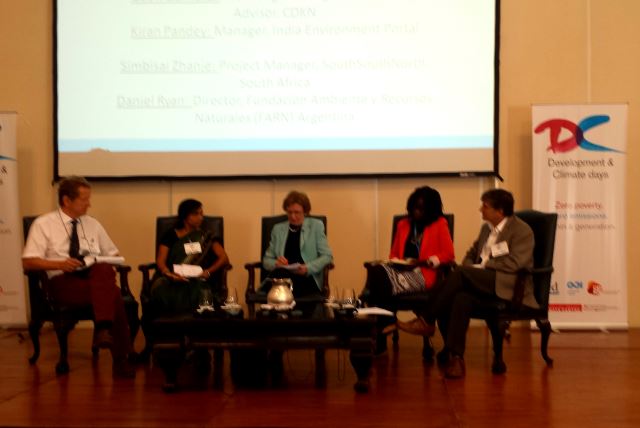Mary Robinson encourages cooperation and participation to achieve zero-zero goals during a panel session at the Development and Climate Days in Lima/ COP20
On day 2 of the event, Mary Robinson chaired two panel discussions; one on integrating climate change and development programmes and one on harnessing effective knowledge management to achieve “zero-zero”.
The dialogue is part of a wider conversation prompted by the 5th Synthesis Report of the IPCCC, the UNFCCC negotiations being held at COP20 in Lima as well as the finalising of the Sustainable Development Goals in 2015.
The first discussion focused on the ways that development agencies are learning how to effectively integrate climate change into development programming – and thereby achieving significant reductions in extreme poverty and net GHG emissions towards the zero-zero target within a generation. Panellists included:
- Vera Scholz – Head of the Climate and Environment Department, GIZ
- Adrian Fitzgerald – Policy Lead for Climate Change-Resilience Policy Team, Department of Foreign Affairs and Trade, Government of Ireland
- Ryan McRobert, Policy Advisor – International Climate Change, Government of Scotland
In the second part of the session, specialists from climate and development knowledge broker organisations talked about how they are generating and making available information, evidence, data and knowledge on climate and development issues. The speakers shared their experience and views on successful strategies and much needed new approaches for climate and development knowledge brokerage.
Speakers included:
- Kiran Pandey, Co-ordinator, India Environment Portal
- Geoff Barnard, Knowledge Management Strategy Advisor, CDKN
- Simbisai Zhanje, Project Manager, SouthSouthNorth, South Africa
The common theme emerging from both discussions was the need for climate action and development programmes to be more integrated and for the climate change and development communities to work in partnership. Panellists in both sessions pointed out gaps on a number of levels in decision making and called for stronger involvement of local communities in knowledge sharing and policy making processes in order to achieve the zero-zero goals.
Adrian Fitzgerald from Irish Aid said the key issue is to make sure people are involved and consulted in decision making and that they have access to adequate resources to respond to the situations they are presented with.
Kiran Pandey from the India Environment Portal also called for people to come together for better cooperation and accessible knowledge sharing, but also suggested that we, rather than looking at occurring problems, focus on solutions that drive these development and climate actions.
Ryan McRobert emphasised the need for a human rights based approach focused on sustainable development to respond to climate change, which is, he said, ” the biggest threat to development in the 21st century”.
Commenting on zero-zero, Mary Robinson stressed that a fair, ambitious and legally binding climate agreement in 2015 is needed to achieve a fair and equitable world with zero emissions and zero extreme poverty. Greater participation and access to information for all will help inform a more robust agreement and more effective climate policies .
Mrs Robinson emphasised that democratic processes at all levels will be necessary to enable an effective carbon phase-out that protects human rights to achieve the zero-zero goals. She stated:
“All countries and citizens must act in solidarity, motivated by enlightened and collective self-interest for a better future.”
After the session, Mary Robinson concluded: “Zero emissions, zero poverty, within one generation – the climate justice way is the way to go!”
This year’s Development & Climate Days were organised by IIED in conjunction with CDKN, The Red Crescent Climate Change Centre and CDKN and took part from 6th-7th of December during COP20 in Lima.
Related Links
MRFCJ Research Pisiton Papaer: Zero Carbon the Climate Justice Way
UN Secretary General commenting on SDGs and Climate Change
MRFCJ Presentation on the importance of participation in the UNFCCC negotiations
Case Studies: Innovative Uses of Climate Finance – Demonstrating Leadership


